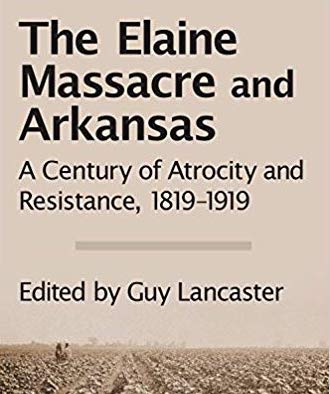 The Elaine Massacre occurred in Phillips County, Arkansas in September 1919. Representatives of the Progressive Farmers and Household Union of America met with approximately 100 Black farmers at a church to discuss unionizing. A group of White men interrupted the meeting and two of the White men were shot. In response, the sheriff organized a posse composed largely of White veterans who had recently returned from fighting in World War I. A mob of 500-1,000 white people stormed through Phillips County and killed Black men, women, and children on sight. At least 100 African Americans and possibly as many as 250 were killed, according to accounts from that era.
The Elaine Massacre occurred in Phillips County, Arkansas in September 1919. Representatives of the Progressive Farmers and Household Union of America met with approximately 100 Black farmers at a church to discuss unionizing. A group of White men interrupted the meeting and two of the White men were shot. In response, the sheriff organized a posse composed largely of White veterans who had recently returned from fighting in World War I. A mob of 500-1,000 white people stormed through Phillips County and killed Black men, women, and children on sight. At least 100 African Americans and possibly as many as 250 were killed, according to accounts from that era.
While investigating the 1919 Elaine Massacre in preparation for its centennial commemoration, University of Arkansas at Little Rock history professor Brian Mitchell discovered that Leroy Johnston, a Black World War I veteran and victim of the massacre, had his medical records altered, denying him military honors that he deserved.
Johnston was a private in the United States Army. He enlisted on November 9, 1917 at the age of 23. He went overseas in December 1917 and was honorably discharged on July 5th, 1919. While serving he was wounded and gassed in the Battle of Chateau-Thierry. His medical records were intentionally altered from “severely” wounded to “slightly” wounded, which impeded him from receiving any awards for being wounded in action.
After discovering this injustice, Dr. Mitchell gathered Johnston’s military and medical records and submitted the information to the United States Department of the Army to request that Johnston be awarded medals for his service during World War I. He also contacted U.S. Representative French Hill who worked to ensure that Johnston finally received his medals. In an upcoming ceremony, Johnston will receive the Purple Heart with one Bronze Oak Leaf Cluster for wounds received in action. He will also receive the World War I Victory Medal with France Service Clasp and Champagne Marne, Aisne-Marne, and Meuse-Argonne Battle Clasps, and the World War I Victory Button.
More information on the incident can be found in the book The Elaine Massacre and Arkansas: A Century of Atrocity and Resistance, 1819-1919, edited by Guy Lancaster (Butler Center for Arkansas Studies, 2018).








